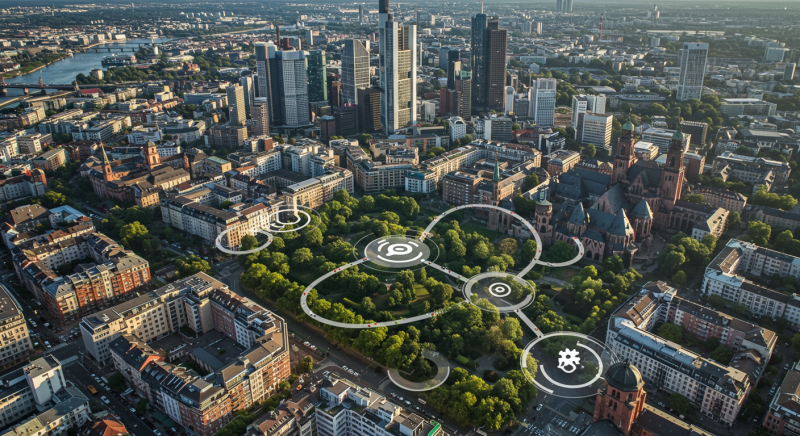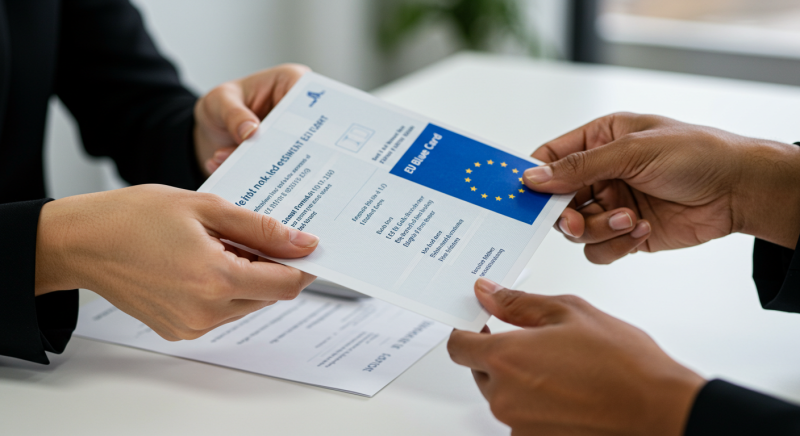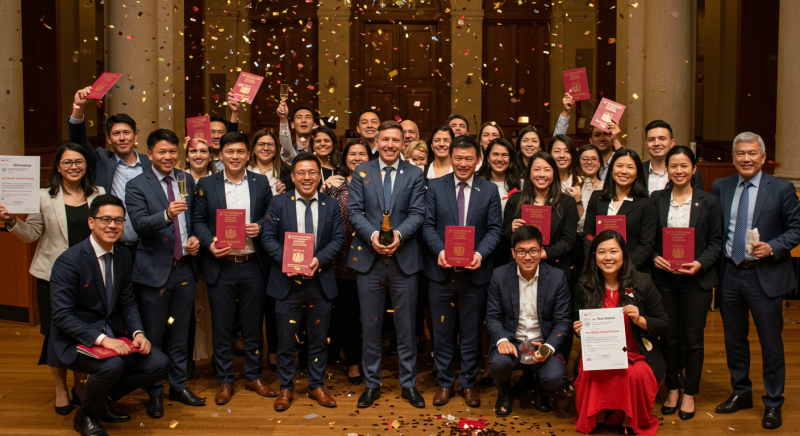Have you ever dreamed of advancing your career while experiencing the rich culture and high quality of life in Germany? Visa sponsorship jobs in Germany offer qualified professionals exactly that opportunity, serving as your golden ticket to one of Europe’s strongest economies. With a progressive immigration system designed to attract global talent, Germany has positioned itself as a premier destination for international professionals seeking career advancement alongside a balanced lifestyle.
The German job market is actively seeking skilled workers across numerous sectors, and employers are increasingly willing to sponsor work visas for the right candidates. Whether you’re an engineer, IT specialist, healthcare professional, or scientist, visa sponsorship jobs in Germany could be your pathway to professional fulfillment and personal growth in the heart of Europe.
Key Takeaways:
Germany faces a skilled labor shortage, creating abundant opportunities for qualified international professionals.
The EU Blue Card is a streamlined pathway for highly qualified workers seeking visa sponsorship jobs in Germany.
Tech, engineering, healthcare, and scientific research offer the most promising visa sponsorship jobs in Germany.
German language proficiency significantly increases your employability, though many multinational companies operate in English.
Proper preparation, including credential recognition and cultural research, boosts your chances of landing visa sponsorship jobs in Germany.

The Current Landscape of Visa Sponsorship Jobs in Germany
Germany’s economy continues to experience robust growth in 2025, despite global economic uncertainties. According to the Federal Employment Agency (Bundesagentur für Arbeit), the country faces a significant skilled labor shortage with approximately 1.8 million unfilled positions across various sectors. This labor gap has created an unprecedented opportunity for qualified international professionals seeking visa sponsorship jobs in Germany.
The German government has responded to these workforce challenges with progressive immigration policies designed to attract global talent. In 2020, the Skilled Immigration Act (Fachkräfteeinwanderungsgesetz) significantly expanded opportunities for qualified non-EU professionals to work in Germany. This legislation has made it easier than ever to pursue visa sponsorship jobs in Germany, particularly for those with recognized qualifications and in-demand skills.
According to the German Economic Institute (IW), the labor shortage costs the German economy approximately €30 billion annually, representing about 0.9% of GDP [Source: https://www.iw-koeln.de/en/studies/economic-effects-of-the-skilled-worker-shortage-in-germany.html]. This economic reality creates a compelling incentive for German employers to offer visa sponsorship jobs in Germany to qualified international candidates.
Understanding Visa Options for Working Professionals
The EU Blue Card: Premium Access to Visa Sponsorship Jobs in Germany
The European Union Blue Card represents the most streamlined pathway for highly qualified professionals seeking visa sponsorship jobs in Germany. This residence permit offers numerous advantages, including a path to permanent residency in just 21 months for those with German language skills at the B1 level.
To qualify for the EU Blue Card, you need: A university degree (either German or recognized foreign qualification) An employment contract with a minimum annual gross salary of €58,400 (2025 figure) or €45,552 for shortage occupations A job offer related to your qualifications
The Blue Card has become increasingly popular among international professionals targeting visa sponsorship jobs in Germany, with over 35,000 cards issued annually according to the Federal Office for Migration and Refugees (BAMF) [Source: https://www.bamf.de/EN/Themen/Statistik/statistik-node.html].
Work Visa for Qualified Professionals
If you don’t meet the salary threshold for the Blue Card but possess recognized professional qualifications, the standard work visa offers another pathway to visa sponsorship jobs in Germany. This visa requires: Recognized vocational training or university degree A specific job offer matching your qualifications Approval from the Federal Employment Agency
Job Seeker Visa: Finding Visa Sponsorship Jobs in Germany While In-Country
Germany offers a unique opportunity through its Job Seeker Visa, allowing qualified professionals to spend up to six months in Germany searching for visa sponsorship jobs in Germany. This visa requires: A recognized degree Proof of financial resources to sustain yourself Basic German language skills (typically A1 level)
This option provides a significant advantage, as in-person networking and interviews can substantially increase your chances of securing visa sponsorship jobs in Germany.
Top Industries Offering Visa Sponsorship Jobs in Germany
Information Technology: The Digital Gateway to Germany
The German IT sector faces a shortage of approximately 137,000 specialists according to Bitkom, the country’s digital association [Source: https://www.bitkom.org/EN/top-themes/digital-transformation-of-the-economy.html]. This shortage has created fertile ground for international professionals seeking visa sponsorship jobs in Germany in fields such as: Software development Cybersecurity Data science and analytics Cloud computing Artificial intelligence
Tech hubs like Berlin, Munich, and Hamburg have emerged as hotspots for visa sponsorship jobs in Germany in the digital sector, with companies like SAP, Siemens, and numerous startups actively recruiting international talent.
Engineering: Building Your Future in Germany’s Industrial Powerhouse
Germany’s reputation for engineering excellence creates consistent demand for qualified professionals. Mechanical, electrical, automotive, and renewable energy engineering represent particularly promising fields for visa sponsorship jobs in Germany.
The VDI (Association of German Engineers) reports a shortage of approximately 64,000 engineers nationwide, creating favorable conditions for international professionals [Source: https://www.vdi.de/presse/publikationen/vdi-ingenieurmonitor]. Companies like Bosch, BMW, and Volkswagen regularly sponsor visas for qualified engineering talent.
Healthcare: Caring Careers with German Stability
Germany’s aging population has generated significant demand for healthcare professionals, making medical careers among the most accessible visa sponsorship jobs in Germany. Doctors, nurses, and specialists with recognized qualifications can find numerous opportunities, particularly in: Elderly care Specialized medicine Physiotherapy Mental health
The German Hospital Federation (DKG) estimates a shortage of approximately 30,000 full-time nursing positions nationwide, highlighting the potential for qualified healthcare professionals to secure visa sponsorship jobs in Germany.

Scientific Research: Innovating Your Way to Germany
With substantial public and private investment in research and development, Germany offers numerous opportunities for scientists and researchers. Universities, research institutes like Max Planck and Fraunhofer, and pharmaceutical companies provide attractive visa sponsorship jobs in Germany for those with advanced qualifications.
Practical Steps to Secure Visa Sponsorship Jobs in Germany
Credential Recognition: The Essential First Step
Before applying for visa sponsorship jobs in Germany, ensure your qualifications are recognized in the German system. The process varies by profession:
For regulated professions (doctors, teachers, engineers), formal recognition is mandatory before applying for visa sponsorship jobs in Germany.
For non-regulated professions, recognition is recommended but not always required.
The “Recognition in Germany” portal (www.anerkennung-in-deutschland.de) provides detailed guidance specific to your profession and qualification country.
Language Requirements: Sprechen Sie Deutsch?
While many international companies offer visa sponsorship jobs in Germany with English as the working language, German proficiency significantly enhances your employability. According to a survey by the Association of German Chambers of Industry and Commerce (DIHK), 56% of companies cite language barriers as a major challenge when integrating international professionals.
Consider investing in German language courses before pursuing visa sponsorship jobs in Germany. The Goethe Institut offers recognized courses both online and worldwide. Even basic German skills demonstrate commitment and facilitate everyday life once you’ve secured one of the many visa sponsorship jobs in Germany.
Job Search Strategies: Finding Your German Opportunity
When searching for visa sponsorship jobs in Germany, utilize specialized platforms that cater to international professionals:
Make-it-in-Germany.com: The official government portal for qualified professionals StepStone.de: A leading job portal with an English interface LinkedIn: Set your location preference to Germany and use filters for English-speaking positions Xing: The German equivalent of LinkedIn, popular among local employers
Tailor your application for the German market when pursuing visa sponsorship jobs in Germany: Include a professional photo on your CV (standard practice in Germany) Prepare a comprehensive application package including certificates and references Highlight specific skills and qualifications relevant to the German market
Networking: Your Social Capital for German Success
Building professional connections significantly increases your chances of finding visa sponsorship jobs in Germany. Consider:
Joining professional associations in your field Attending virtual and in-person industry events Connecting with alumni from your university who work in Germany Engaging with expatriate groups for insider knowledge about visa sponsorship jobs in Germany
The Application Process: From Job Offer to Work Permit
Once you’ve secured a job offer, your employer will typically support your visa application. The process for obtaining authorization for visa sponsorship jobs in Germany generally follows these steps:
- Your employer submits the position to the Federal Employment Agency for approval
- Upon approval, you apply for a work visa at the German embassy in your home country
- After arriving in Germany, you register your residence and receive your work/residence permit
Processing times for visa sponsorship jobs in Germany vary by country of origin and specific circumstances, typically ranging from a few weeks to several months. Planning ahead and maintaining clear communication with your employer is essential for a smooth transition.
Life After Landing Visa Sponsorship Jobs in Germany: What to Expect
Securing one of the many visa sponsorship jobs in Germany is just the beginning of your German adventure. Prepare for:
Integration Courses and Support
The German government offers integration courses to help newcomers adapt. These typically include: Language training Cultural orientation Information about the German legal system and everyday life
Many companies offering visa sponsorship jobs in Germany provide additional support for international employees, including relocation assistance and cultural training.
The Path to Permanent Residency
After working in Germany for a period (typically 21-33 months for Blue Card holders, or 4-5 years for standard work visa holders), you can apply for permanent residency. This provides long-term security beyond your initial visa sponsorship jobs in Germany.
Cultural Adaptation: The Human Side of Professional Migration
While pursuing visa sponsorship jobs in Germany, remember that professional success involves cultural adaptation. German workplace culture values: Punctuality and reliability Direct communication Work-life balance Clear hierarchies and responsibilities
Understanding these cultural nuances helps you thrive beyond securing visa sponsorship jobs in Germany.

Common Challenges and How to Overcome Them
Language Barriers: Breaking Through
Even if your visa sponsorship jobs in Germany utilize English as the working language, everyday life often requires German. Address this by: Starting language lessons before relocation Using language learning apps for daily practice Finding a language exchange partner Requesting language courses as part of your employment package
Bureaucracy: Navigating the German System
Germany’s thorough administrative procedures can seem daunting to newcomers. When pursuing visa sponsorship jobs in Germany, prepare for: Multiple forms and documentation requirements The need for certified translations Registration procedures (Anmeldung) Health insurance enrollment
Many employers offering visa sponsorship jobs in Germany provide relocation support to help navigate these processes.
Conclusion: Your German Professional Journey Awaits
The abundance of visa sponsorship jobs in Germany presents a remarkable opportunity for qualified professionals seeking international career advancement. With its strong economy, excellent social systems, and high quality of life, Germany offers not just employment but a holistic improvement in living standards.
By understanding the visa pathways, focusing on in-demand industries, and preparing thoroughly for both the application process and cultural transition, you can successfully join the ranks of international professionals who have built rewarding careers through visa sponsorship jobs in Germany.
The journey requires diligence and preparation, but the professional and personal rewards make the effort worthwhile. Whether you’re drawn by career advancement, work-life balance, or European adventure, visa sponsorship jobs in Germany offer a viable path to achieving your goals in one of the world’s most stable and prosperous economies.
Frequently Asked Questions About Visa Sponsorship Jobs in Germany
What qualifications are most in-demand for visa sponsorship jobs in Germany?
IT specialists, engineers, healthcare professionals, and scientists currently have the best prospects for visa sponsorship jobs in Germany. Specific shortage occupations include software developers, electrical engineers, registered nurses, and specialists in artificial intelligence and machine learning.
Is German language proficiency required for visa sponsorship jobs?
While many international companies offer English-speaking positions, German language skills significantly increase your employability. For customer-facing roles and positions in smaller companies, German proficiency is often required for visa sponsorship. Even for English-speaking roles, basic German helps with daily life and integration.
What is the minimum salary required for the EU Blue Card in Germany?
For 2025, the minimum annual gross salary requirement is €58,400 for general professionals and €45,552 for shortage occupations. These thresholds apply when seeking visa sponsorship jobs via the Blue Card pathway.
How long does it take to process a work visa for Germany?
Processing times vary by country of origin and individual circumstances. Typically, after receiving a job offer for visa sponsorship, the visa process takes between 4-12 weeks. Planning ahead and ensuring complete documentation can help minimize delays.
Can family members join someone who has secured visa sponsorship jobs in Germany?
Yes, most work visas allow for family reunification. Spouses of professionals with visa sponsorship typically receive work authorization automatically, and children can attend German public schools free of charge.
READ MORE
